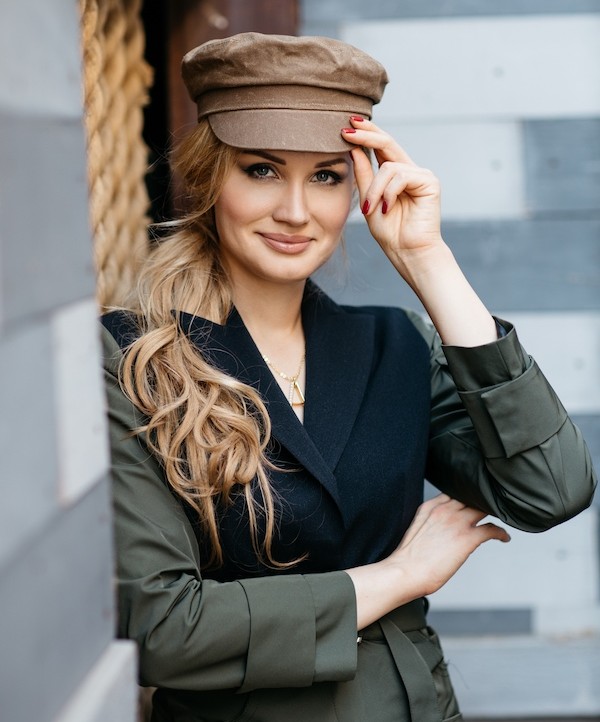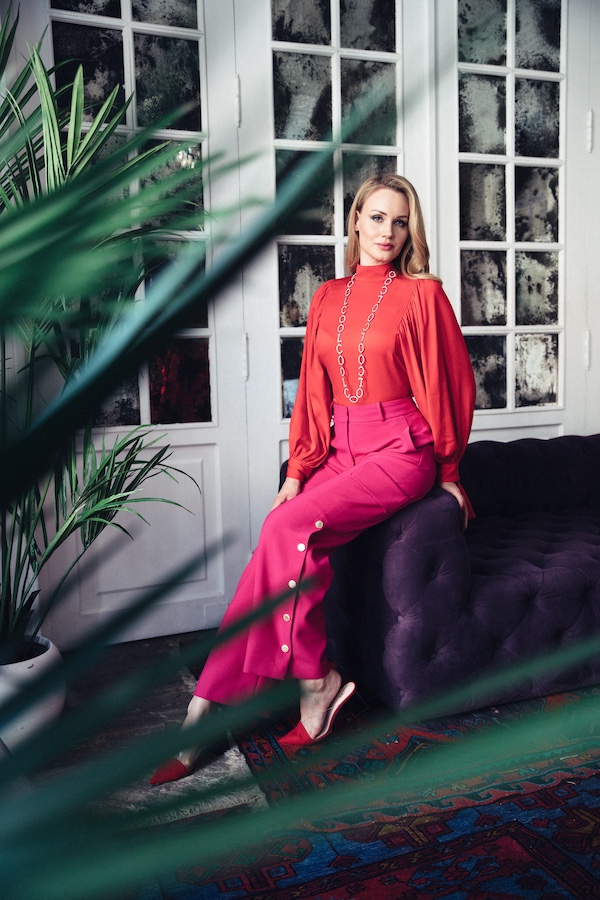Spotlight on philanthropist Aya Antropova
Aya Antropova, who found her vocation as the ambassador of the Antropov Foundation, talks to Charlotte Pasha about travel, philanthropy and being a millennial

It’s no overstatement to say that Aya Antropova, 32, knows Mayfair and St James’s extremely well. She’s based off Berkeley Square and says it is the “unique combination of a busy megapolis with peaceful meditativeness of natural parks and squares” that she loves about the area.
As for favourite haunts: “I love the cosiness of Shepherd Market, the splendour of the Royal Academy of Arts, the glamour of The Wolseley and The Ritz and New Bond Street with its boutiques, galleries and auction houses. Mayfair and St James’s offer an irresistible mix of history, networking, education, glamour and classiness.”
But most of Antropova’s time in the area is spent not socialising, but working. Aya is the ambassador of the Antropov Foundation, which supports cultural and educational projects, “as well as initiatives that increase overall social responsibility”. She also runs a non-profit publication, The Beginning.
“Published in Europe, the US and Russia, it is addressed to the critically and independently thinking readership,” she says. A recent project was the screening of the documentary Vysotsky…Odessa Notebook. “Many Russian-speaking and even English-speaking residents in Mayfair are not indifferent to the musical heritage of the great Russian bard and poet Vladimir Vysotsky,” she says.
“In November 2019, our foundation launched the premiere of the documentary and held the reception at the cinema theatre at the May Fair Hotel. The son of the poet, actor Nikita Vysotsky, attended the premiere, as well as the friend of the poet, sculptor and artist Michael Chemiakine.
“We also had some other star guests from the cinema and show-business world like producer, filmmaker and writer Kyra Pahlen and the ‘Superman’ producer Pierre Spengler. So the evening was a great success.”
One of Antropova’s career highlights was the first International Philanthropy Summit held by the Antropov Foundation in Monaco. “It attracted people who identify themselves as ‘citizens of the world’, which means they think globally rather than parochially,” she says. “Mr. Olivier Wenden, the director of the Foundation of Prince Albert II of Monaco, shared his views on challenges faced by present-day philanthropy. We were also privileged to have such outstanding contributors as the permanent speaker at the World Economic Forum, adviser to the European Parliament, member of the Advisory Scientific Committee of the European Systemic Risk Board (ESRB) eminent economist Dr Daniel Gros; Rupert, Graf von Strachwitz, the founder of The Maecenata Institute for Philanthropy and Civil Society and Sir Stelios Hadji-Ioannou, the famous founder of the Easy family of brands and participant of the Giving Pledge group.

“Listening to them was a transformational experience in itself. This forum was a first major-scale initiative run by our foundation at this high level and involving strategic philanthropy planning and other global societal, economic and social issues.
“I am proud to say that after the Philanthropy Summit we continued to collaborate with our speakers, Dr Daniel Gros and Dr Christoph Abels, fellow of the Hertie School of Governance.
“Having forged a strategic partnership with Dr Gros, who also runs CEPS (Centre for European Policy Studies), we were honoured to participate in the Idea Labs conference that took place in early March 2020 in Brussels.
“The Antropov Foundation chaired the discussion Black Swans: In Search for Patterns of Unforeseen Events. It attracted a lot of attention as one of the most relevant subjects – Black Swan is a new term that emerged after the publication of the eponymous book by Nassim Taleb. It now stands for unpredictable or unforeseen events, typically with extreme consequences, like the one that is happening right at the moment. We were extremely lucky to run the conference early in March, as the whole Europe went into full lockdown caused by the COVID-19 epidemic straight afterwards.”
As with everyone, the foundation has been impacted by the Covid-19 crisis. “We moved online for a while, yes,” says Antropova. “I also hope that the current situation with Coronavirus will impact societal attitudes and values. This common threat to all humanity reminds us that we are, after all, mortal. It helps people to become aware that the most important thing is life itself, along with health, family, relationships and meaningful, rather than superficial, communication.”
Philanthropy aside, Antropova’s hobbies and interests include sport, visiting architectural and natural landmarks, music, gemmology – “I have signed for a professional gemmology certificate course” – and travel, namely to Monaco, Paris and Moscow. Unusually, she started as a lawyer, but then switched to an acting career, having taken both a make-up and modelling course as a teen.
When asked how she ended up in philanthropy while she could pursue a career as a model and actress, she says: “Making a career change does not mean that I was not happy being a lawyer, or working as a model or actress – it only means that we are always looking for something that will fulfil us personally. I can say that I have this sense of personal fulfilment only now. At least, it agrees with me. Moreover, I find that all my previous professional experience plays an important role in my present activities.”
Antropova falls into the millennial age category, and I ask her to describe her generation’s view of philanthropy. “On the one hand, millennials have to think about how to make ends meet and, consequentially, direct more energies and resources to issues of survival,” she says. “On the other hand, many of them try to distance themselves from this rat race and make do with much less than their parents.”
She adds: “According to a 2018 study in Forbes, more than 80 per cent of millennials with a relatively regular income donated to charity, and 70 per cent donated more than an hour to a charitable cause – they come across as more aware of environmental and ethical issues and concerned with responsible consumption.”
It leaves Antropova optimistic about her generation. “It is also owing to millennials that such practice as ‘downshifting’ became widely spread. This generation is not so keen on luxury brands and expensive things – they seem to value creativity, experiences and new impressions more than things. However, they seem to be more dependent on social approval and especially, social media.”
There are big plans for the foundation’s year ahead. “Despite the difficulties we face this year, we are now working on a two-volume publication, titled Stairs in Art, the creative initiative of the artist and sculptor Michael Chemiakine. The book comes out as part of our project, The Imaginary Museum. The Anthology of Forms.”
Finally, I ask Antropova what advice she would give to those looking to make a difference today. “One should take care of one’s health and mental wellbeing before engaging in philanthropy professionally. Becoming a mature and responsible individual first is important before getting involved with serious philanthropic and charitable activity. One should train oneself to keep things in perspective and concentrate on what is truly important, otherwise one will end up being engulfed by everyday challenges.”
More lightheartedly, she adds: “I also believe in the old proverbial British practice of ‘a good deed for the day’, no matter how insignificant or small. It helps to bring about significant changes in small steps.”
Wise words indeed, and they feel more apt now than ever before.

